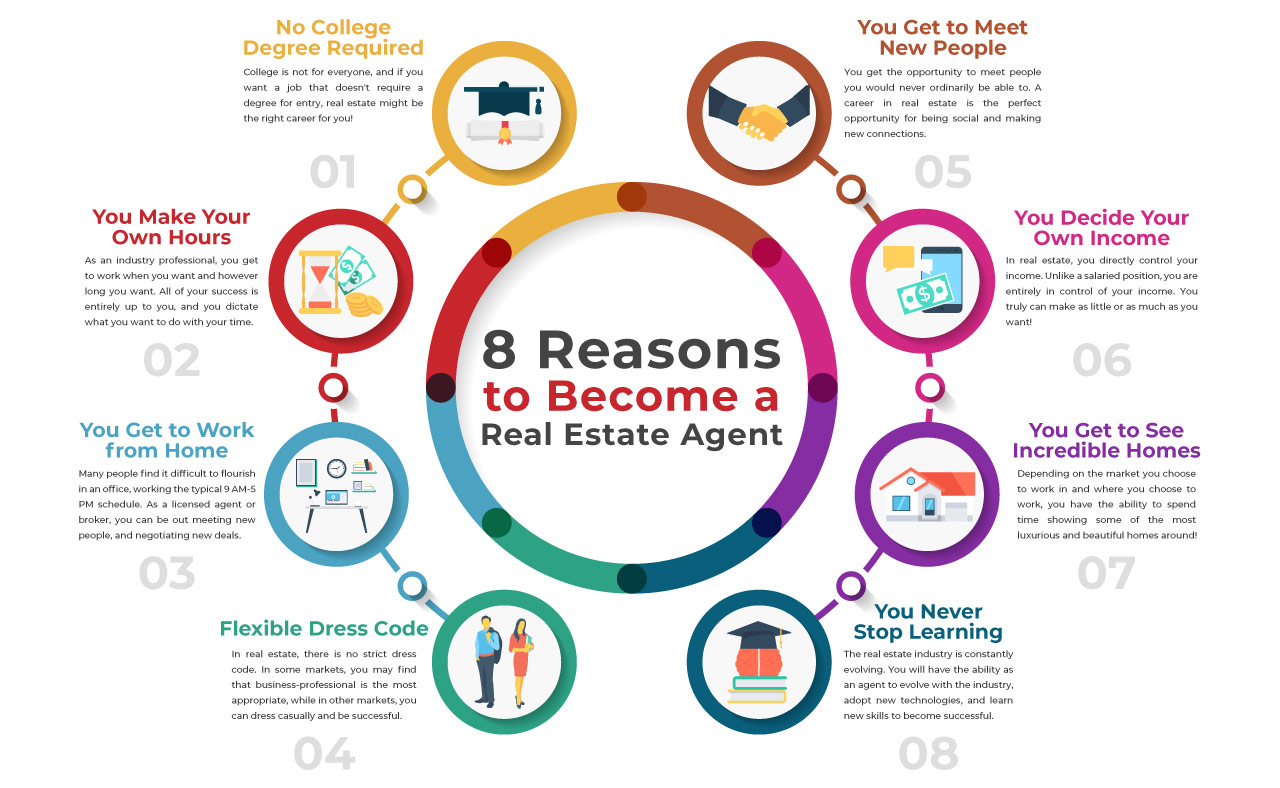
You must fulfill certain requirements to become a licensed Pennsylvania real estate agent. The process takes around a week and it is very simple. Real estate licenses are not free. You will need to pay fees for education and business expenses. In addition to that, you'll need to pay for a personal marketing campaign and continuing education.
The application process will require you to fill out paperwork and pass an exam. All of these steps can be done online, which makes the entire process much easier.
To earn a highschool diploma, you must first complete an accredited course. Make sure that your background checks have been updated. You will, for example, need to have a criminal background check in order to work with kids. If you can show that you have a financial hardship or an emergency, you might be eligible to get an exemption.

You must then complete at most four credits of real-estate instruction. These can be achieved by attending classes at a school authorized by the Pennsylvania Real Estate Commission. If you don't have a school near you, you can opt for an online course. It's a smart idea to take a program that allows for you to work at your own pace.
Next, you will need to apply for a license at the Pennsylvania Real Estate Commission. Your license will cost $176. This includes a wallet-sized version. It isn't free. The real estate commission and broker who sponsored you must be paid. After you obtain a license, you will need to renew it every 2 years. A $96 renewal fee, which can be paid using a credit-card, is required.
Finally, you will need to take a course in education that teaches you about Pennsylvania's real property market. A leasing agent can be a good option for someone who doesn't want to have a full time job. Leasing agents have the opportunity to earn a good part-time income, while also enjoying the stability and growth potential of the realty business.
A glossary of terms is one thing you can do in preparation for the PA real estate licensing exam. You can find the glossary in PDF format or on the PALS website. It contains key terms and concepts that are relevant to real estate. It is not necessary to log in to access the glossary, but it can help you to learn important terminology and avoid spending too much time reading.

The other thing you should do is find a reliable, trusted resource for all your education needs. You'll want to look for courses that include audio lessons. Listening to lectures can help you gain knowledge on topics that you are not familiar with. A quiz online is another useful tip.
FAQ
How do I calculate my interest rate?
Interest rates change daily based on market conditions. The average interest rate over the past week was 4.39%. Multiply the length of the loan by the interest rate to calculate the interest rate. For example, if $200,000 is borrowed over 20 years at 5%/year, the interest rate will be 0.05x20 1%. That's ten basis points.
What is a "reverse mortgage"?
Reverse mortgages allow you to borrow money without having to place any equity in your property. It allows you to borrow money from your home while still living in it. There are two types: government-insured and conventional. Conventional reverse mortgages require you to repay the loan amount plus an origination charge. FHA insurance will cover the repayment.
How do I get rid termites & other pests from my home?
Your home will be destroyed by termites and other pests over time. They can cause damage to wooden structures such as furniture and decks. To prevent this from happening, make sure to hire a professional pest control company to inspect your home regularly.
What are the chances of me getting a second mortgage.
However, it is advisable to seek professional advice before deciding whether to get one. A second mortgage is used to consolidate or fund home improvements.
Statistics
- When it came to buying a home in 2015, experts predicted that mortgage rates would surpass five percent, yet interest rates remained below four percent. (fortunebuilders.com)
- Some experts hypothesize that rates will hit five percent by the second half of 2018, but there has been no official confirmation one way or the other. (fortunebuilders.com)
- Over the past year, mortgage rates have hovered between 3.9 and 4.5 percent—a less significant increase. (fortunebuilders.com)
- The FHA sets its desirable debt-to-income ratio at 43%. (fortunebuilders.com)
- Based on your credit scores and other financial details, your lender offers you a 3.5% interest rate on loan. (investopedia.com)
External Links
How To
How to Find an Apartment
When moving to a new area, the first step is finding an apartment. This requires planning and research. This involves researching neighborhoods, looking at reviews and calling people. While there are many options, some methods are easier than others. Before renting an apartment, you should consider the following steps.
-
Data can be collected offline or online for research into neighborhoods. Websites such as Yelp. Zillow. Trulia.com and Realtor.com are some examples of online resources. Offline sources include local newspapers, real estate agents, landlords, friends, neighbors, and social media.
-
Find out what other people think about the area. Yelp. TripAdvisor. Amazon.com have detailed reviews about houses and apartments. You can also find local newspapers and visit your local library.
-
To get more information on the area, call people who have lived in it. Ask them what the best and worst things about the area. Ask them if they have any recommendations on good places to live.
-
Take into account the rent prices in areas you are interested in. You might consider renting somewhere more affordable if you anticipate spending most of your money on food. You might also consider moving to a more luxurious location if entertainment is your main focus.
-
Find out more information about the apartment building you want to live in. What size is it? What price is it? Is the facility pet-friendly? What amenities does it have? Are there parking restrictions? Do tenants have to follow any rules?